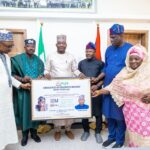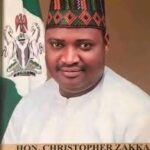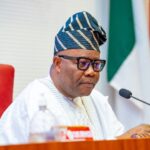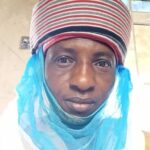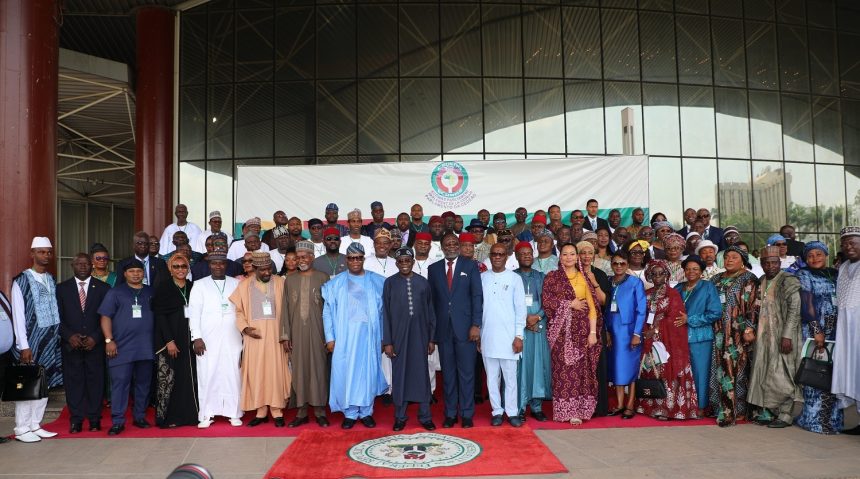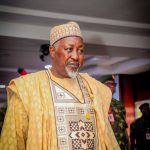By Linus Aleke, Abuja
The Chairman of Authority of Heads of State and Government, and Nigeria’s President, Sen. Bola Ahmed Tinubu, on Thursday, inaugurated the Community Parliament of the Economic Community of West African States, otherwise known as ECOWAS Parliament, as the Togolese delegation to the 6th Parliament that was supposed to produce the new speaker was conspicuously absent.
The Togolese delegation were supposed to produce the next Speaker of the Parliament, following the existing tradition of rotation of the Speakership, as established by the Parliament in line with alphabetical order.
Finding by ThisNigerian shows that power play by Togolese authority led to its inability to submit the list of its delegation before the date of the inauguration.
Further finding by our correspondent also revealed that the country’s inability to send its list as at when due was not unconnected with the upcoming parliamentary elections in the country.
Some insiders, however, dismissed the claim, insisting that the Togolese President wanted to foist his brother on the Parliament in contrast to the tradition where the deputy speaker who is already groomed for the job.
The Gambian delegation is also embroiled in legal tusel, following the removal of former MPs who are perceived to be opposed to the president’s style of leadership back home.
This is as the outgoing Speaker, Dr. Sidie Mohammed Tunis, told members of the newly inaugurated 6th Legislature, that the work of a Parliament cannot be exhausted.
President Bola Tinubu, also pledged his support for the proposed direct election of members to the parliament of the Economic Community of West African States (ECOWAS).
Inaugurating the 97 members into the 6th ECOWAS parliament at the International Conference Centre in Abuja, President Tinubu, said that as a one-time legislator himself, he look forward to reviewing the proposal regarding direct elections, stressing that “we stand to support the direct elections into ECOWAS parliament”.
Tinubu’s comments came on the backdrop of the ECOWAS parliament being peopled by existing lawmakers from the national Parliament of 15 member states.
“The practice of directly electing public officers aligns with democratic principles, principles that Nigeria upholds. This principle is also in line with the spirit of the ECOWAS protocol on democracy and good governance. We believe this will ensure that citizens will have a direct say in their representation and the legitimacy and credibility it will provide,” Tinubu said.
He assured members of the sixth ECOWAS Parliament that Nigeria, as host of the community, will continue to support the Parliament to achieve its objectives.
The outgoing Speaker who was drafted in as the ceremonial speaker pending when the Togolese authority resolve its crisis, urged the new MPs to continue from where the 5th Parliament stopped.
The Speaker who said this during the inauguration of the 6th Parliament in Abuja, also noted that though the region is experiencing some moments of progress, resilience, and hope, there equally remain several pressing issues that are shaping the socio-political landscape of the sub region which require their prompt and robust actions.
He said “Issues ranging from the high cost of living, threat to democratic
governance, security challenges, consolidating peace and
strengthening regional solidarity, as well as the multitude of challenges that are impacting the well-being of our youthful
population. Furthermore, while it is customary for each legislature to set
its own agenda, I passionately appeal that the campaign for the election of Members into the ECOWAS Parliament by direct universal suffrage remains at the top of your agenda”.
The 5th Legislature, he said,
raised a lot of awareness about the matter.
Dr. Tunis expressed optimism that the 6th Legislature will strengthen the fight for direct election, as it is a requirement for representative governance.
“I am confident that with the quality of membership you have, faithfully serving the interest of the peoples of the Community, success will be achieved in these regards. As I conclude, it is important to note that even though 6 years of my life in the ECOWAS Parliament comes to an end today, I shall continue to have a tenacious link with this institution,” he concluded .
In his goodwill message, the Minister of Foreign Affairs, Amb Yusuf Maitama Tuggar, underscores the imperative of the Parliament to continues to work in synergy with the ECOWAS Commission and other Institutions that serve as the executive and judicial arms of ECOWAS.
The balance between executive, judicial and legislative arms, he said, is critical for effective, responsive and transparent governance.
He noted that in the face of the various challenges confronting the region, including security, as well as the unity of the region, the role of the Parliament is more important than ever.
“This was recently demonstrated by the key role played by Senegal’s judiciary in ensuring that national elections were not delayed. ECOWAS is no different. Let us remember that democracy is a process not an event.The Parliament, and other Community Institutions, are of vital importance in promoting democracy and regional stability. It is, therefore, imperative that the Parliament continues to work in synergy with the ECOWAS Commission and other Institutions that serve as the executive and judicial arms of our organization. Collaboration between the Commission, Court and Parliament is essential to ensure the smooth implementation of policies and programs that benefit our citizens. I encourage you to maintain constructive dialogue with other bodies and to align your efforts with the broader objectives of ECOWAS,” he noted.
Amb. Tuggar, who is also the Chairman of Council of Ministers, said that he look forward to more robust engagement and collaboration with the Parliament, as the closest representatives of the Community citizens.
This, he said, is with a view to amplifying the values of ECOWAS and increasing its visibility through programmes and projects that have direct beneficial impacts on the citizens.
The parliament is composed of 115 seats. Each member state has a guaranteed minimum of five seats, while the remaining 40 seats are shared based on population.
They include 35 members from Nigeria and five each from the Benin Republic, Cabo Verde, The Gambia, Guinea-Bissau, Liberia, Sierra Leone, and Togo.
Others include eight members from Ghana, seven from Cote d’Ivoire, and six each from Senegal and Guinea.
Mali, Niger, and Burkina Faso have no representatives in the sixth parliament, as these states have expressed their intention to exit the bloc.


